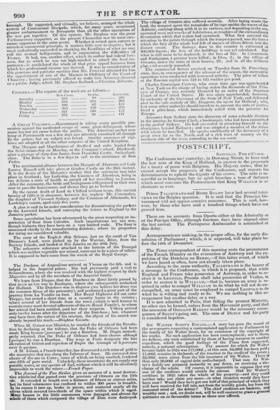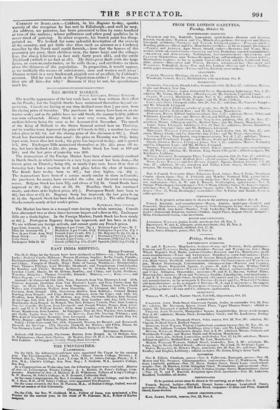SIR WALTER SCOTT'S ESTATE.—A story has gone the round of
the newspapers respecting a contemplated application to Parliament by the family of Sir Walter Scott, for an extension of the copyright of his works. No such application has been contemplated ; nor is there, we believe, any wish entertained by them of having recourse to another expedient, which the good feelings of the Times first suggested, namely, a national subscription. The amount for which Sir Walter became liable in 1825 was 117,0001.; of this sum, 64,000/. has been paid; 11,000/. remains in the'hands of the trustees to the credit of the estate; 22,000/. more arises prom the life insurance of Sir Walter. There is thus only 20,000/. of capital debt undischarged. That sum Sir W!il- ter's family are prepared instantly to. pay down, on receiving a dis- charge of the whole.- course, it is impossible to suppose that any one of the creditors IN -ould stickle for interest. Had Sir Walter's creditors in 1825 taken the whole of his property—and they could neither take nor claim any more—in what situation would they have been now? Would they have got one half of that principal of which they will have received the full tale, not from the worldly goods, but from the immortal mind of the debtor? The chief creditors are bankers, and wealthy men ; and, we doubt not, will be well content to grant a genera/ quittance on so favourable terms as those now offered. CORBETT IN SCOTLAND.- Cobbett, in his Register to-day, speaks warmly of the reception he has met in Edinburgh--and well he may. An address, we perceive, has been presented to him by some hundred or two of the natives ; •whose politeness and other good qualities he is never tired of praising. In other respects, his Scotch jaunt has disap- pointed us. We looked for some splendid description of the scenery of the country, and get little else than such an account as a Cockney traveller by the North mail could furnish,-how that the houses of the peasantry are poor, their children rosy, the farms large and the villages few, the sheep Cheviots (a fact only forty years old), and the cattle Highland (which is no fact at all). He finds great fault with the large farms, or corn-manufactories, as he calls theta; and attributes to them alone the thinness of the population. In proportion, it would appear, as we multiply the means of subsistence, men and women melt away Human neture is a very backward, piggish sort of an affair, by Cobbett's account. Did he ever look at the Population-tables ? But he swears they are all lies-for why? Because if they be not, his speculations must be.



























 Previous page
Previous page